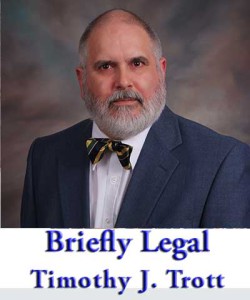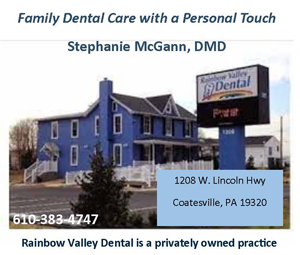The answers might be surprising to you
Editor’s Note: Today marks the first column by noted West Chester attorney and educator Timothy J. Trott. He will address various legal issues and offer insight to the legal process.
By Timothy J. Trott, Columnist, The Times
 You think you don’t have a will? Well, you do. The Commonwealth of Pennsylvania did all the work for you. And you didn’t even have to pay a lawyer.
You think you don’t have a will? Well, you do. The Commonwealth of Pennsylvania did all the work for you. And you didn’t even have to pay a lawyer.
If you have chosen not to write a legally binding will, the state will determine how your estate will be handled, who will get what and how much, and your survivors won’t be able to do much about it. Not only can this cause hurt feelings among your family and friends, it could result in a probate process that is more complicated than necessary (and therefore more expensive). It can also create a tax burden to the estate that may have been reduced or even avoided if you had a will.
When you have a will, you determine how your bills are to be paid, and how your assets will be distributed and how your other affairs will be handled. Do you want leave anything to charity? Do you want someone to have a special memento? Do you want your spouse to get everything? Do you have a family member with special needs? A well drafted will can take care of all of these things. Without one, your goals will not be achieved.
If you don’t have a will, the state says you have died “intestate”. This means without testament; without a will. The state intestacy statute will then apply. In plain English, the law provides the scheme of distribution which may very well conflict with your desires. It is not enough to say, “My survivors will know what I want.” Because it doesn’t matter. The legally mandated distribution will apply.
Here’s how it works. Say you’re married, with two children and you want to leave everything to your surviving spouse. You are confident that he or she will know what to do with the inheritance. Simply put this in a will, and your surviving spouse gets everything—tax free. If you don’t have a will, here’s what will happen under the law. Your spouse will get the first $30,000.00 of your estate plus one half of the balance. The remaining balance will be divided among your children. The portion passing to your spouse is tax free. The share passing to your children is tax free if they are under 21. If not, they are taxed at 4.5%. By the way, this example can get even more confusing when one considers today’s modern families.
If you think your estate is too small for any of this to matter, think again. Add up the value of your home, your employer sponsored retirement plan, life insurance other investments, personal property and you can find that you have left behind quite a mess for your survivors. I’ve seen it happen too many times.
If you want to keep things simple, just have a will—that says what you want it to say–drawn up by a competent professional. Do it yourself at your own risk!
A good estate plan will also have an Advance Directive for Health Care, also known as a living will. Be sure to consult your health care provider regarding those important medical treatment decisions. A Power of Attorney can also be a useful part of your estate plan. Just be sure one is appropriate in your case. Your lawyer can provide the necessary guidance on this and all estate planning issues.
What should all this cost? When you meet with your lawyer, be sure you understand how he or she will be charging. A flat fee? An hourly rate? For most estate plans, an experienced estate planning attorney should be able to quote you a fee by the end of the meeting. The final cost will depend on the complexity of your plan. What are your goals? What does your lawyer need to do to accomplish them. By the way, some estates contain different types of trusts. Be aware that trusts can drive up the cost as these are complicated documents, and can be problematic if not done right.
So if you want to control what happens to your personal affairs, money, assets and obligations, a sound estate plan is essential. Consult your lawyer. Make sure your lawyer is experienced in estate planning and will listen to you. Be certain that he or she understands your needs. Get a firm fee quote. Then rest easy knowing your family is taken care of.
Timothy J. Trott is a West Chester-based attorney with a legal practice covering a number of specialities. Fro more details, please visit his Website: ttrottlaw.com . The information in this article is for general information purposes only, and is not intended as legal advice. For advice on your specific situation, please consult your attorney







